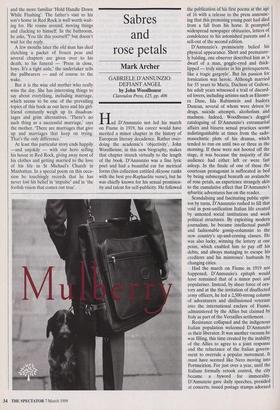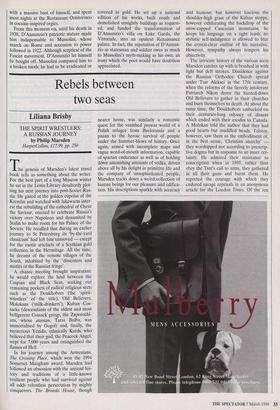Sabres and rose petals
Mark Archer
GABRIELE D'ANNUNZIO: DEFIANT ANGEL by John Woodhouse Clarendon Press, £25, pp. 406 Had D'Annunzio not led his march on Fiume in 1919, his career would have merited a minor chapter in the history of European literary decadence. Rather over- doing the academic's 'objectivity', John Woodhouse, in this new biography, makes that chapter stretch virtually to the length of the book. D'Annunzio was a fine lyric poet and had a beautiful ear for metrical forms (his collection entitled Alcyone ranks with the best pre-Raphaelite verse), but he was chiefly known for his sexual promiscu- ity and talent for self-publicity. He followed the publication of his first poems at the age of 16 with a release to the press announc- ing that this promising young poet had died from a fall from his horse. It prompted widespread newspaper obituaries, letters of condolence to his astonished parents and a sell-out of the second edition.
D'Annunzio's promiscuity belied his physical appearance. Short and premature- ly balding, one observer described him as 'a dwarf of a man, goggle-eyed and thick- lipped — truly sinister in his grotesqueness, like a tragic gargoyle'. But his passion for fornication was heroic. Although married for 55 years to Maria, Duchess of Gallese, his adult years witnessed a trail of discard- ed lovers, including artistes such as Eleono- ra Duse, Ida Rubinstein and Isadora Duncan, several of whom were driven to drugs, suicide attempts, alcoholism and madness. Indeed, Woodhouse's dogged cataloguing of D'Annunzio's extramarital affairs and bizarre sexual practices seems indistinguishable at times from the sado- masochistic plots of his dramas, which tended to run on until two or three in the morning. If these were not hooted off the stage, it was because the majority of the audience had either left or were fast asleep. In the finale of one of these the courtesan protagonist is suffocated in bed by being submerged beneath an avalanche of rose petals, an experience strangely akin to the cumulative effect that D'Annunzio's sybaritic adventures has on the reader.
Scandalising and fascinating public opin- ion by turns, D'Annunzio rushed to fill that void in post-unification Italian life created by untested social institutions and weak political structures. By exploiting modern journalism, he became intellectual pundit and fashionable gossip-columnist to the new country's up-and-coming classes. He was also lucky, winning the lottery at one point, which enabled him to pay off his debts, and always managing to escape his creditors and his mistresses' husbands by changing cities.
Had the march on Fiume in 1919 not happened, D'Annunzio's epitaph would have remained that of a minor poet and populariser. Instead, by sheer force of ora- tory and at the the invitation of disaffected army officers, he led a 2,500-strong column of adventurers and disillusioned veterans into the international enclave of Fiume, administered by the Allies but claimed by Italy as part of the Versailles settlement.
Resistance collapsed and the indigenous Italian population welcomed D'Annunzio as their liberator. It was another vacuum he was filling, this time created by the inability of the Allies to agree to a joint response and the reluctance of the Italian govern- ment to overrule a popular movement. It must have seemed like Nero moving into Portmeirion. For just over a year, until the Italians formally retook control, the city became a byword for immorality. D'Annunzio gave daily speeches, presided at concerts, issued postage stamps adorned with a massive bust of himself, and spent most nights at the Restaurant Ornitorinco in cocaine-inspired orgies. From this moment on, until his death in 1938, D'Annunzio's patriotic stature made him indispensable to Mussolini, whose march on Rome and accession to power followed in 1922. Although sceptical of the Fascist movement, D'Annunzio let himself be bought off. Mussolini compared him to a broken tooth: he had to be eradicated or covered in gold. He set up a national edition of his works, built roads and demolished unsightly buildings as request- ed, and funded the transformation of D'Annunzio's villa on Lake Garda, the Vittoriale, into an opulent Renaissance palace. In fact, the reputation of D'Annun- zio as statesman and soldier owes as much to Mussolini's myth-making as his own, an irony which the poet would have doubtless appreciated.



























































 Previous page
Previous page